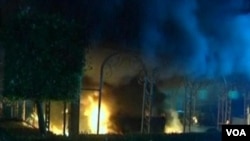WHITE HOUSE —
President Barack Obama moved late Wednesday to head off further potential political damage from the controversy over his administration's response to last year's terrorist attack on a U.S. diplomatic facility in Libya.
The White House released 100 pages of emails detailing intense debate among administration officials and the CIA about how to word public "talking points" after the attack in Benghazi.
Four Americans, including U.S. Ambassador Christopher Stevens, were killed in the attack.
The emails were originally requested by Republican lawmakers investigating the response to the Benghazi attacks. Until Wednesday, the White House had declined to make them public, allowing lawmakers only to review them.
The decision to release the emails was an effort to calm the furor over the Benghazi issue, which with other controversies threatens to slow or damage Mr. Obama's second-term agenda.
Republicans accused the administration of mishandling security and the response to the attack. They asserted that mentions of prior terrorist threats, including by groups linked to al-Qaida, were removed for political reasons.
The emails confirm what had been reported before by media organizations: that then-State Department spokeswoman Victoria Nuland asked that a reference to an al-Qaida linked group, Ansar al-Sharia, be removed.
In the email she expresses concern that the content could be used by members of Congress to "beat" the State Department for not heading CIA warnings.
One former White House official, former National Security Council spokesman Tommy Vietor, referred to "massive disinformation" at the time in the U.S. Congress.
Final talking points eliminated CIA references to Ansar al-Sharia, and to CIA warnings about extremist threats linked to al-Qaida in Benghazi and eastern Libya.
Also eliminated was a reference to "indications that Islamic extremists participated in the violent demonstrations" in Benghazi.
Earlier Wednesday, White House Press Secretary Jay Carney reiterated President Obama's remark earlier this week that the Republican investigation was a political "sideshow."
"It is absolutely political. And we have in the course of this been focused on what isn’t political and what is essential, which is the fact that four Americans were killed and we need to find those who are responsible and bring them to justice. ((OPT)) Secondly, we need to take action to ensure that the inadequate security that clearly existed at the time, because we could not protect those four Americans, be looked at and addressed so that it doesn't happen again," Carney said.
Release of the emails does not end the Benghazi controversy, as Republicans press for additional documents.
Republican Representative Darrell Issa welcomed the email release but said there is still much more for Americans to learn about the administration's response to the Benghazi attack.
The White House released 100 pages of emails detailing intense debate among administration officials and the CIA about how to word public "talking points" after the attack in Benghazi.
Four Americans, including U.S. Ambassador Christopher Stevens, were killed in the attack.
The emails were originally requested by Republican lawmakers investigating the response to the Benghazi attacks. Until Wednesday, the White House had declined to make them public, allowing lawmakers only to review them.
The decision to release the emails was an effort to calm the furor over the Benghazi issue, which with other controversies threatens to slow or damage Mr. Obama's second-term agenda.
Republicans accused the administration of mishandling security and the response to the attack. They asserted that mentions of prior terrorist threats, including by groups linked to al-Qaida, were removed for political reasons.
The emails confirm what had been reported before by media organizations: that then-State Department spokeswoman Victoria Nuland asked that a reference to an al-Qaida linked group, Ansar al-Sharia, be removed.
In the email she expresses concern that the content could be used by members of Congress to "beat" the State Department for not heading CIA warnings.
One former White House official, former National Security Council spokesman Tommy Vietor, referred to "massive disinformation" at the time in the U.S. Congress.
Final talking points eliminated CIA references to Ansar al-Sharia, and to CIA warnings about extremist threats linked to al-Qaida in Benghazi and eastern Libya.
Also eliminated was a reference to "indications that Islamic extremists participated in the violent demonstrations" in Benghazi.
Earlier Wednesday, White House Press Secretary Jay Carney reiterated President Obama's remark earlier this week that the Republican investigation was a political "sideshow."
"It is absolutely political. And we have in the course of this been focused on what isn’t political and what is essential, which is the fact that four Americans were killed and we need to find those who are responsible and bring them to justice. ((OPT)) Secondly, we need to take action to ensure that the inadequate security that clearly existed at the time, because we could not protect those four Americans, be looked at and addressed so that it doesn't happen again," Carney said.
Release of the emails does not end the Benghazi controversy, as Republicans press for additional documents.
Republican Representative Darrell Issa welcomed the email release but said there is still much more for Americans to learn about the administration's response to the Benghazi attack.





